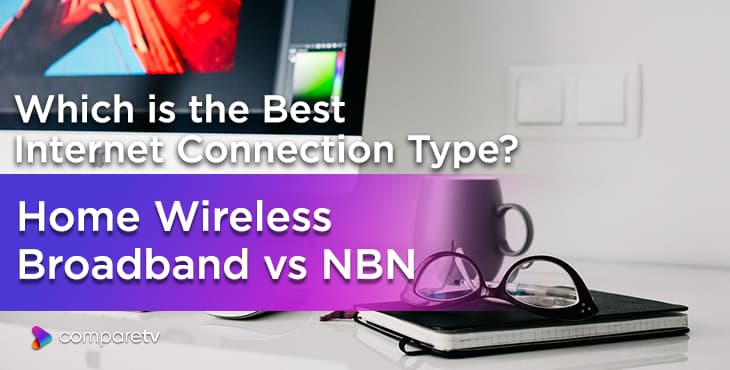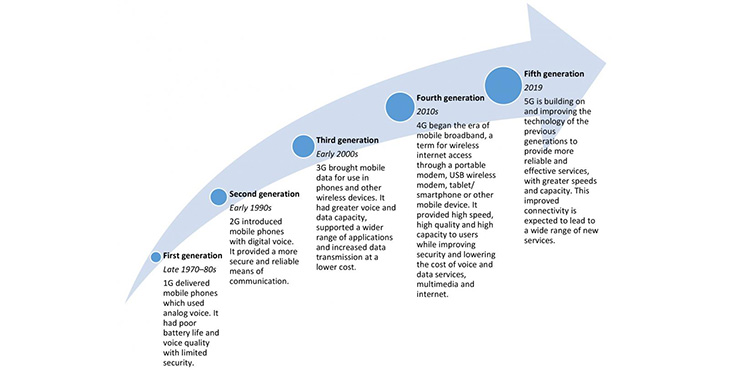
It’s a complex decision process if you’re trying to choose between NBN connections and home wireless broadband. Each has its specific pros and cons, and they’re different in many ways. It helps to have as much information as possible about these connections before you decide on home wireless plans or an NBN connection.
We’ve gathered the information you will need if you want to establish an internet connection and are unsure which is right for you. Home wireless broadband vs NBN connections – here are the differences you should consider.
What’s In This Guide?
What is Home Wireless Broadband?
What home wireless broadband provides its users are internet connections that run on existing mobile networks, which may be private connections that function on the 5th or 4th generation of wireless technology. The networks are 5G or 4G networks, and this global wireless technology uses radio waves instead of fibre connections.
You’ll notice that 5G networks are more efficient than previous generations, like 4G, and its advantages go beyond fast downloads. It offers fewer delays for internet users loading content and higher data limits.

This technology runs via carriers that roll out 5G home internet networks and offer higher bandwidths. A real-world example of the benefits of 5G could be for streaming or downloading movies, which can take a few seconds. And to be specific about the streaming quality, you can get HD video and audio with 5G home wireless broadband.
Providers such as Telstra currently have the highest 5G availability, and their users can connect to 5G 17.5% of the time compared with other providers Statista surveyed, according to recent statistics.
What are NBN Internet Services?
NBN connection options function under NBNCo, a government-owned business that provides fixed-line connections with various technology types.
Some of the main fixed-line connection options you might have heard of include fibre-to-the-premises, fibre-to-the-building and hybrid fibre coaxial connections. Others include fibre-to-the-curb and fibre-to-the-node. Now, according to research, some of these technology types provide faster speeds than others using specific modems and ethernet cables.
Fibre-to-the-premises provides the most reliable internet connection and offers speeds reaching 1Gbps, while fibre-to-the-node provides speeds between 50Mbps and 100Mbps.
With companies like Moose NBN and Dodo internet, you can sign up for NBN plans and receive a modem with your subscription. With this modem, you’ll connect to the NBN network using an ethernet cable and a power lead that connects to the power socket.

Key Differences Between Home Wireless Broadband and NBN Connections
But how is wireless broadband different from NBN connections? Well, we’ve looked at the key differences between the two, including security, scalability and data allowances. Check the facts just here for all the details.
NBN VS Home Wireless Broadband Security
One thing’s for sure, NBN connections in many locations are highly secure. They’re more secure than wireless internet connections that use a wireless signal. The main reason for this enhanced security is its technology type, as wired connections aren’t susceptible to hacking.
Wireless broadband, unfortunately, can be vulnerable to cyber security issues – some studies in which researchers surveyed 127 wireless routers even found that every router had more than 100 security vulnerabilities. So whether you want to complete online shopping or banking with NBN connections, you’ll have greater security with NBN connections. But there’s more.
NBN VS Home Wireless Broadband Scalability
Scalability-wise, NBN tends to be the better choice. If your household or business is large, the NBN connection can generally cope with plenty more users, and it won’t slow down (the higher the NBN speed tier you choose, the more devices you can connect with less latency).
You’ll notice that this scalability and capacity to connect more devices to the internet has enhanced economic benefits to Australian businesses expecting a 2% productivity benefit increase per year thanks to NBN internet connections.
Wireless Internet VS NBN speeds
You’ll see that NBN tends to be much faster than home wireless because of its high-quality fibre optic cables. The increased speed you’ll receive happens because your data transmits using light, which doesn’t get hindered by any interference or obstacles. What this increased speed translates to in terms of use cases is quality entertainment streaming on multiple devices, which doesn’t experience lag or buffering.
| NBN Speed | Description |
|---|---|
| NBN 25 | The Standard Evening Speed is ideal for smaller households with basic internet requirements, such as internet browsing, moderate online streaming in SD, and online gaming. Average speeds (7-11pm) for NBN 25 are 25 Mbps download and 4 Mbps upload. |
| NBN 50 | The Standard Plus Evening Speed is for busier households as it can accommodate more browsing, video streaming in HD on 2 devices at once, and responsive gaming. Typical speeds (7-11pm) are 50 Mbps download and 17 Mbps upload. |
| NBN 100 | Prior to the arrival of the latest speed add-ons (Superfast and Ultrafast), NBN 100 was the fastest speed tier in Australia. Typical speeds (7-11pm) are 100 Mbps download and also 17 Mbps upload. It’s fit for big households and can even accommodate 4K streaming. |
| NBN 250 | Only available to FTTP and most HFC customers, the Superfast NBN has typical download speeds of 250 Mbps, which means it’s great for larger households who need to use the internet to browse, video-call, play online games, stream in HD and Ultra HD, download, and upload files, all at the same time. |
| NBN 1000 | Aptly called the Ultrafast, it’s currently the fastest speed tier offered in Australia. While this speed plan might be too much for those who have no need for something this lightning fast, the advent of streaming, gaming, and the arrival of 8K technology, however, make the NBN 1000 add-on plan an appealing option for many. Telstra is one of the providers in Australia that offers the Ultrafast plan, alongside Aussie Broadband and MyRepublic. |
What Are the Maximum Speeds Available for NBN Connections?
NBN connections typically range from 25Mbps to 600Mbps download speeds, yet some providers even offer speed tiers of 1000Mbps. These maximum speed tiers are usually available with fibre-to-the-premises (FTTP) technologies, so if you have a different technology type, it’s worth asking if FTTP upgrades are possible with your internet service provider.
Home Wireless Broadband VS NBN Pricing
Generally, you’ll notice that NBN plans are often more expensive than home wireless broadband. For instance, if you look at TPG’s 5G home internet plans and compare them to their NBN plan, you’ll see that their 5G home internet plan is slightly faster than their NBN connection.
Overall, if you can afford an NBN connection and don’t travel frequently it’s a worthwhile option over home wireless broadband. But home wireless is more wallet-friendly.
Home Wireless Broadband VS NBN Modems
You’ll see some modem differences between home wireless plans and NBN. If you select an NBN connection, you will need an NBN-compatible modem. If your technology type is fibre-to-the-curb, fibre-to-the-premises or hybrid fibre coaxial, the modem you select will require a WAN or internet port.
Since the NBN modems function with wires, and the home wireless broadband modems don’t, your home wireless broadband modem uses a battery that facilitates portability. For some models, you’ll see that they use a plug. These modems capture the signal from nearby cellular towers that are nearby.
So if you’re a frequent traveller, it’s well worth considering the advantages of wireless internet because as long as there’s a cellular tower in the area, you can receive a signal easily.
 Featured
FeaturedIs Wireless 4G Better than NBN?
There are a few factors to consider if you compare wireless 4G mobile broadband with NBN plans. The first is the maximum speed of 4G versus your NBN speed options, the second is reliability, and the third is price. We’ve got everything you need to know about these factors just here.
4G Wireless Broadband VS NBN Connection for Download Speed
You may think that wireless 4G offers great speeds, but these speeds can always fluctuate and depend on your provider. If you look at a real case example, you’ll see that many 4G mobile broadband wireless connections that should offer a 100Mbps speed often run at just 30Mbps. Compared with NBN speeds, which also fluctuate, wireless 4G isn’t as fast.
NBN connections are ideal for speed, and every provider will normally disclose the specific speed tiers you will get with this connection type. For example, if you want to sign up for a 50Mbps download speed, the NBN connection you will usually match this speed closely. If the speed does dip, you’ll already know to expect this since the provider will mention that typical evening speeds can be lower.
4G Wireless Broadband VS NBN Connection for Reliability
Now, in terms of reliability, 4G wireless broadband and NBN connections can fluctuate. NBN offers a slightly more stable connection than many 4G broadband plans, and the most basic difference is the technology behind each connection.
While 4G runs on wireless mobile signals, NBN delivers consistent speeds thanks to its fixed-line wire connections. What’s more, 4G is often a backup connection for NBN connections in many cases, such as with Optus, which offers internet users a WiFi 6 modem that’s 4G capable. This fact shows that 4G is less advanced than some NBN connections.
4G Wireless Broadband VS NBN Connection for Price
Just as 5G home wireless broadband is less expensive than NBN connections, so are 4G wireless connections. You won’t get incredibly fast internet compared to the NBN network, but if you need a connection on a budget, it’s well worth considering 4G.
Overall, you get what you pay for with each of these options. Check the website for specific prices when choosing a provider.
NBN Providers with the Top Market Share in Australia
You might have decided that NBN plans are the right option for your household, or you might be looking for an internet provider offering connections on the 5G wireless network. In that case, you’ll have many to choose from, including Telstra and TPG.
Telstra has had the top market share in Australia for many years and is one of Australia’s frequently used internet providers. It’s one of the major telcos offering wireless plans, including NBN fixed wireless plans plus fibre to the premises.
TPG is Australia’s second most popular internet service provider and provides good maximum speeds.

Disadvantages of NBN Plans
Of course, NBN plans aren’t without flaws. Yes, they offer many speed tier options and unlimited data in many cases, and generally, they’re reliable connections. But don’t discount some of these potential issues.
Some Remote Areas May Not Be NBN-Ready
You’ll notice that some telecommunications companies mention that NBN plans are unavailable in specific locations – particularly remote areas. The main reason is the lack of technology for connection types in those locations. What this means is that, for now, you simply won’t be able to access NBN connections in some parts of Australia, although developments are still ongoing.
NBN Speeds Fluctuate Due to Environmental Factors
The NBN network’s higher speeds can also slow down (although this is true for mobile data and wireless connection types). The main causes of these slower speeds include environmental factors or damaged fibre optic cables, which can mean that online gaming privileges with NBN connections are hindered, as can streaming capabilities.
Home Wireless Internet: Which Plan Is Ideal for You?
When selecting home wireless internet, remember that 5G connections are the fastest option. Many providers offer perks such as no excess data charges and no lock-in plans, which means you can make the most of your data or switch plans if needed. Some will include a modem that matches your home wireless broadband requirements, and others will also feature an entertainment bundle package.
Remember that 5G plans may not be available in your local area. If this is the case, you may want to look for an NBN or mobile internet plan to keep connected.
NBN Plans: Which Option Suits Your Requirements?
Since several NBN plans are available from various providers, you might be unsure which option best matches your requirements. But it’s easier than you think to select a plan that works for you – just consider your internet needs and your household size.
If you want to stream entertainment services in high definition or 8K quality, it’s worth selecting an NBN plan that can cater to these requirements, such as an NBN 100 or 250 connection.
Or suppose you’ll be streaming to multiple devices in a large household, or you have online gamer enthusiasts in your home. In that case, you might consider a plan that offers a 250Mbps download speed, which can cope with high-quality streaming or online gaming requirements.
Smaller households might not require such significant download speeds, so you could select an NBN plan with 25Mbps or 50Mbps if you have three or four people in your home. If you also require less internet use and just want to browse the internet, a 25Mbps NBN plan will suit this requirement.
What Are Some Top Features of NBN Connections?
Home Wireless Broadband VS NBN: Which is Ideal For You?
Choosing between home wireless broadband and NBN plans will depend on a few key factors – your location, budget, data usage and speed requirements. A decision like this requires you to look at the providers available to select between the wireless networks or NBN plan structure your internet service provider offers.
Consider the advantages of home wireless broadband vs NBN connections before you choose one, and ensure your internet service provider can offer you the speed you need to stream entertainment or browse the internet, depending on your needs.
Home Wireless Broadband VS NBN FAQs
Still, need extra questions answered related to home wireless broadband vs NBN? The FAQs we’ve answered below will give you the information you’ve been searching for.
There’s a significant advantage to consider when you compare 5G broadband with NBN services that run on copper lines. In cases like this, a 5G broadband plan can be up to 200Mbps faster than copper-line NBN services. But if you’re in an area that doesn’t have good coverage or a strong signal, you might not get the most from your connection.
If you’re in an area where you don’t receive a reliable fixed-line internet connection, you may find that wireless internet services work more efficiently. However, for more extensive internet use, such as streaming entertainment or playing online games, NBN connections may be more comprehensive and will meet your needs.
Home wireless plans can have slower internet speeds and be less consistent than NBN connections. But this can vary from plan to plan and the technology your location has access to. It also depends on the home wireless broadband’s peak speeds, which can be slower than your telco company advertises.
If you select a plan with no data caps, you won’t have any limits on your data for your wireless broadband internet. In this case, your provider will slow your internet speed down when you have consumed all of your data – sometimes to a 25Mbps download and a 5Mbps upload speed – instead of charging you extra for your internet use.
A no lock-in contract means you’ll have the option to change plans or leave your internet service provider without paying any cancellation fees. It’s the opposite of a lock-in contract that will bind you to the internet service and require you to pay fees if you switch to a different plan structure.

























